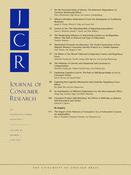-
Views
-
Cite
Cite
Tuba Üstüner, Douglas B. Holt, Dominated Consumer Acculturation: The Social Construction of Poor Migrant Women's Consumer Identity Projects in a Turkish Squatter, Journal of Consumer Research, Volume 34, Issue 1, June 2007, Pages 41–56, https://doi.org/10.1086/513045
Close - Share Icon Share
Abstract
We conduct an ethnographic case study of poor migrant women living in a Turkish squatter to explore how consumer acculturation operates in this important context. Poor migrants have no choice but to engage Turkish consumer culture because it is hegemonic and it conflicts ideologically with their village culture, and they do so with few resources. Our dominated consumer acculturation model specifies three modes of acculturation structured by this context: migrants reconstitute their village culture in the city, shutting out the dominant ideology; or they collectively pursue the dominant ideology as a myth through ritualized consumption; or they give up on both pursuits, resulting in a shattered identity project.



